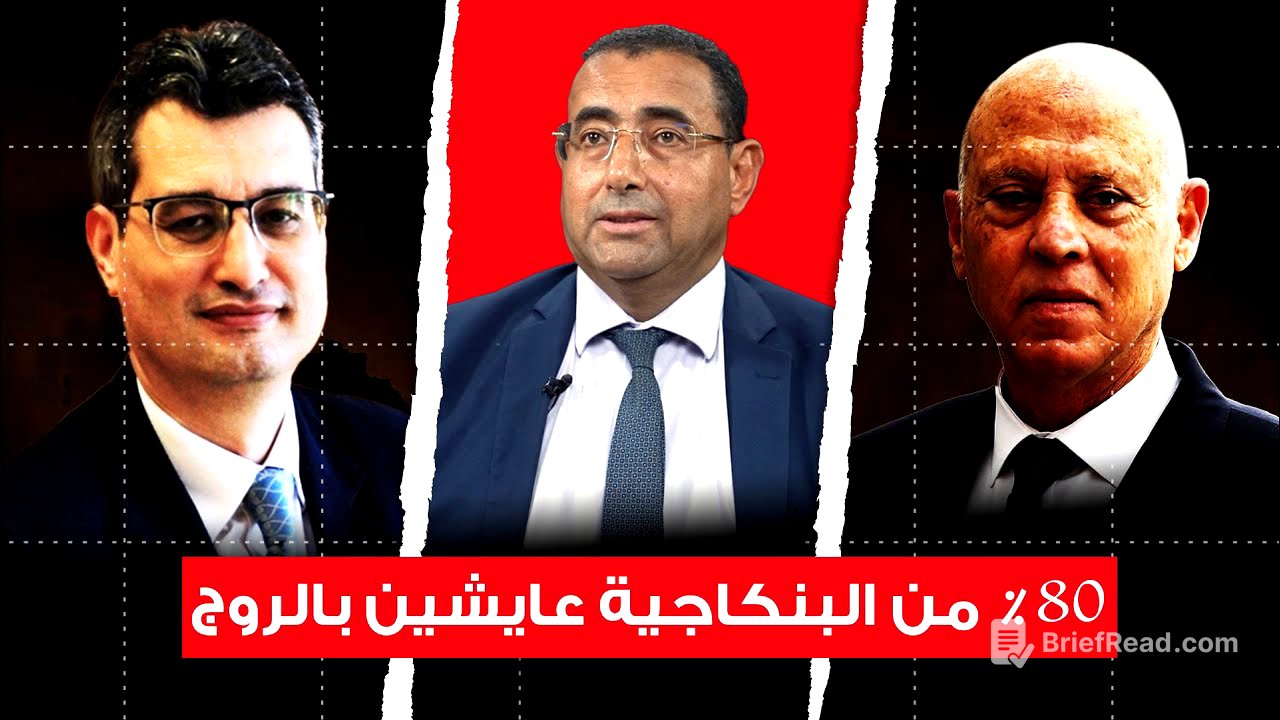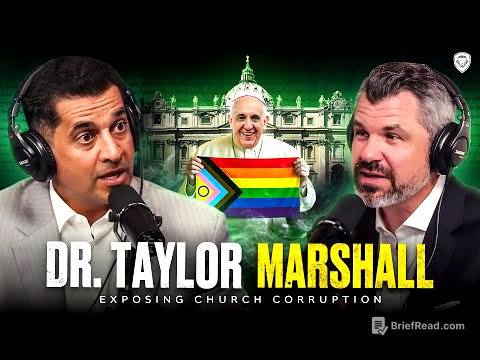TLDR;
This video discusses the reasons behind a potential strike by Tunisian bank employees. It highlights issues such as the striking of union rights, the non-application of Law 41-2 to bank employees, and the harm caused by the 2025 Finance Law. The speaker emphasizes the importance of negotiations for wage restoration and criticizes the lack of response from authorities. He also addresses the demonization of bank employees and defends their contributions to the country.
- The speaker defends bank employees' contributions to the country.
- The speaker criticizes the lack of response from authorities.
- The speaker highlights the harm caused by the 2025 Finance Law.
Escalation and Union Rights [0:05]
The speaker states that escalation was not initiated by the union but is a result of striking the union's rights. He points to the official university page and profiles of university members and basic unions as evidence. The decision to escalate stems from the infringement upon the union's right to strike. The speaker contrasts the current climate of anger among employees with the more peaceful and healthy climate in institutions where union rights are respected.
Law 41-2 and Its Application [0:56]
The speaker discusses Law 41-2, specifically the third paragraph, which divides youth into two categories. This law allows Tunisians who took out loans for over 15 years to benefit from a division, such as reducing an 8% credit to 4% after three years. However, this law is not applied to bank employees because they are considered under the control of foreign and Tunisian capital. The speaker threatens legal action if the law is not applied to bank employees, emphasizing that the law should apply to everyone in Tunisia, regardless of their financial status.
Negotiations and Lack of Response [2:49]
The speaker details the negotiation process with three entities: banking services, banks and financial institutions (represented by the CPF), and the Tunisian Federation of Insurance Companies. Negotiations began in March, but after initial rounds, communication ceased. Despite messages to the Ministry of Finance and the Prime Minister, there was no response. The speaker emphasizes the sensitivity and importance of the banking sector and the need for negotiations to address the harm caused by the finance law.
Impact of the 2025 Finance Law [5:57]
The speaker explains that the 2025 Finance Law targets individuals, deducting up to 550 dinars from their monthly salaries. This affects bank employees, who rely on their salaries and lack capital. The tax schedule in the 2025 finance law has led to deductions from bank employees' salaries, necessitating negotiations to restore wages. The speaker mentions sending proposals to the Tunisian General Labour Union for restorations, but they were disregarded.
Demonization of Bank Employees [7:37]
The speaker questions why bank employees are being unfairly targeted, emphasizing their service to the people, especially during the COVID-19 pandemic. He highlights their contributions to various causes, such as covering floods and contributing to fleet renewal. The speaker argues that demonizing those who serve and finance companies is unjust. He points out that the state benefits from increases in the banking sector through taxes and contributions to the treasury.
Union's Role and Potential Strike [10:08]
The speaker expresses readiness to abandon his university position if it resolves the issues, but he will not abandon the union. He criticizes the Tunisian General Labor Union and offers to step aside if the problem lies with him personally. The speaker mentions a strike telegram and the lack of reaction from authorities. He explains that the bases are questioning the lack of increases and are ready to strike.
Salaries and Living Conditions [11:48]
The speaker addresses misconceptions about bank employee salaries, stating that many live on limited monthly incomes and credit. He contrasts this with the large sums taken as capital by executives and foreign investors. The speaker notes that new bank entrants typically require a Bac Plus 3 education, yet they still struggle financially. He also discusses the impact of illness on round-trip premiums, reducing overall income.
Privileges and Sectoral Differences [15:18]
The speaker refutes the idea that all bank employees have privileges, defending his sector against unfair treatment. He notes that general directors in public banks are more accessible to employees compared to those in private banks. The speaker also highlights that salaries in larger banks are generally better than in smaller banks, and loan benefits vary significantly.
Striking Union Rights and Sectoral Joint Agreement [25:56]
The speaker emphasizes the importance of the sectoral joint agreement in protecting employee dignity. He laments the striking of union rights, which leaves employees vulnerable to arbitrary actions such as transfers and dismissals. The speaker cites examples of employees being transferred far from their families and losing their rights due to the absence of union protection.
Call for Intervention and Reason [31:31]
The speaker calls for intervention from authorities and urges them to use reason to prevent a strike. He highlights the sensitivity of the banking sector and the potential damage to the country's image and economy. The speaker reiterates that bank employees are demanding their rights, not begging for favors, and have been wronged by the financial law. He also points out the injustice of Law 412 not being applied to bank employees.
Examples and Personal Sacrifices [34:51]
The speaker provides examples of how Law 412 benefits clients but not bank employees, leading to financial disparities. He shares personal sacrifices made to advocate for employee rights, including potential financial losses. The speaker emphasizes his humble beginnings and commitment to fighting for justice, regardless of personal consequences.
Negotiations and Demands [37:53]
The speaker reiterates his readiness for negotiations and vows to expose any shortcomings in the process. He emphasizes the importance of giving people their rights and promises to publish the details of any negotiations. The speaker also shares his personal financial information to demonstrate the challenges faced by bank employees.
Commitment and Duty [38:24]
The speaker expresses his unwavering commitment to his duty and convictions, despite potential risks. He emphasizes his integrity and dedication to demanding the rights of the people. The speaker also highlights his love for striking as a tool for change but prefers to avoid it if possible.
Obstruction and Responsibility [41:47]
The speaker identifies the Chairman of the Banking Council and General Directors as those obstructing negotiations and responsible for the potential strike. He calls on the Minister of Finance and the Central Bank to intervene and prevent the strike. The speaker emphasizes that a profitable country benefits when its employees are winners.
Mobilization and Apology [43:31]
The speaker describes the complete mobilization of the sector and apologizes to the Tunisian people for the forced strike. He emphasizes that bank employees are always at the service of the people and have been wronged by the financial law. The speaker also highlights the increased purchasing power and living conditions for all Tunisians, not just bankers.
Call for Dialogue and Rights [47:24]
The speaker calls for prolonged dialogue and the restoration of rights for the banking sector, which has not been given more by 2025. He emphasizes that the sector's rights are being trampled on due to striking union rights. The speaker concludes by asking for forgiveness from the Tunisian people for the forced strike and reiterates their commitment to serving the people.









